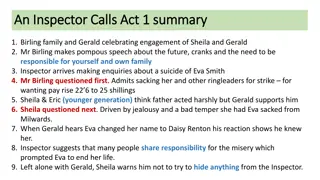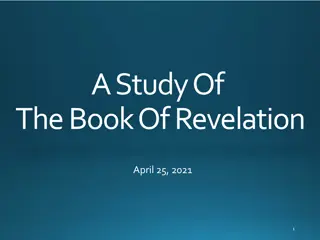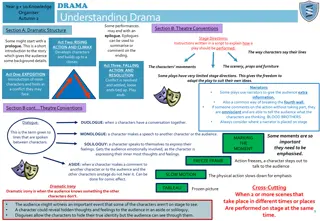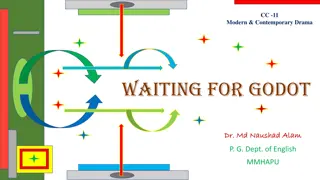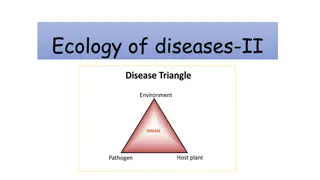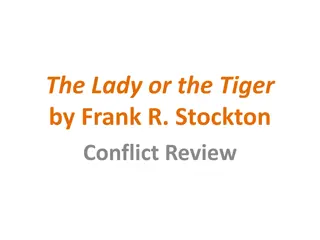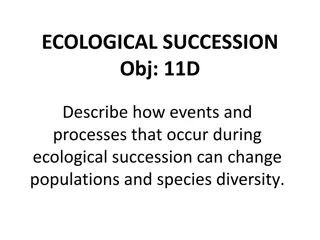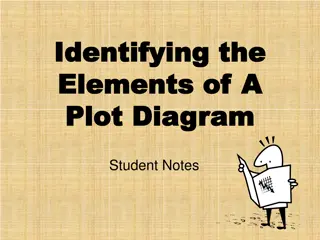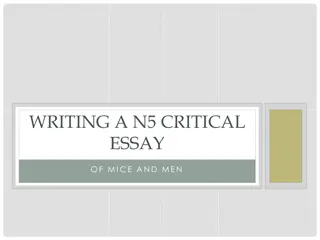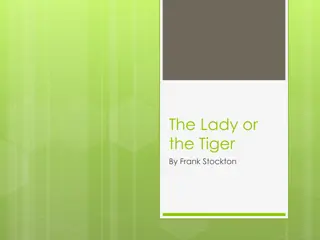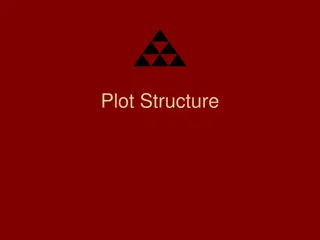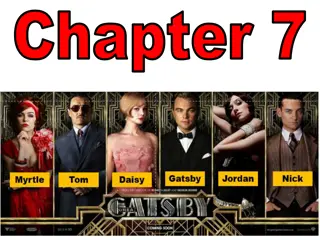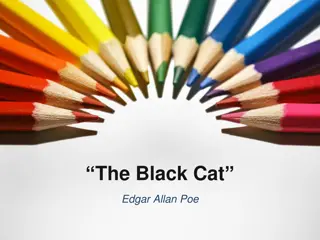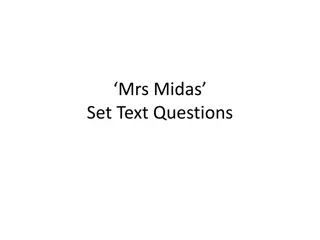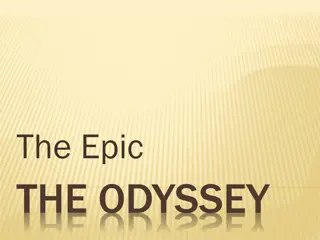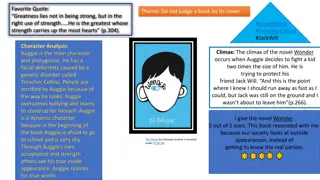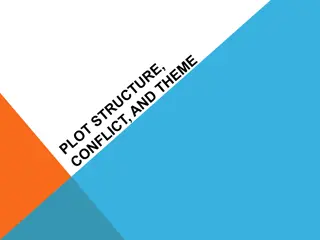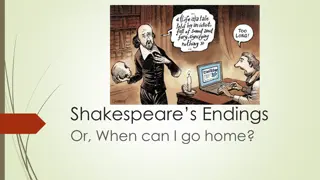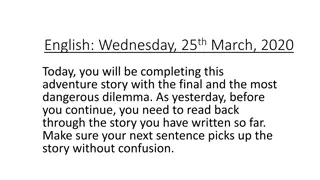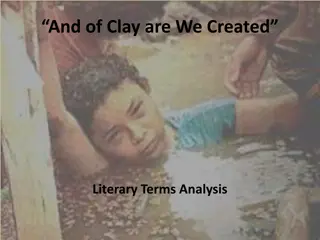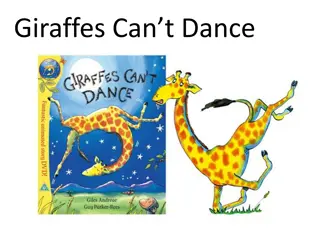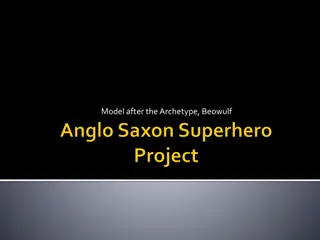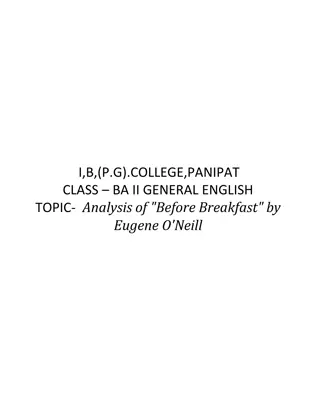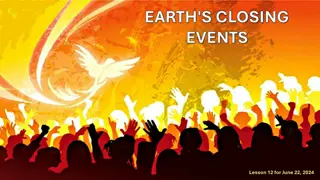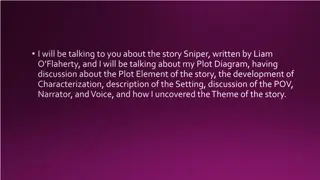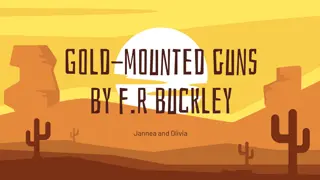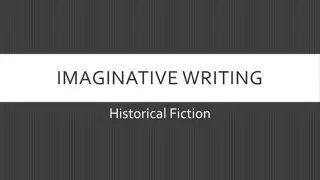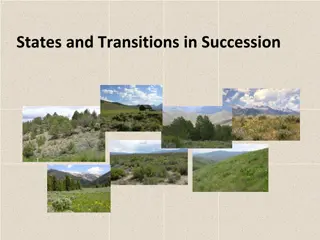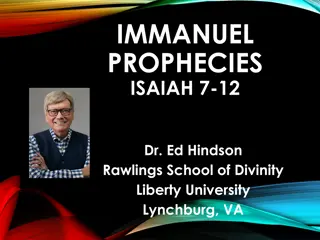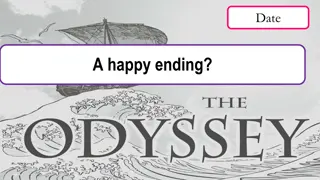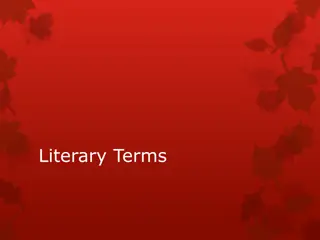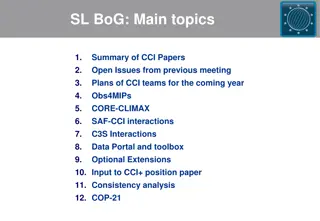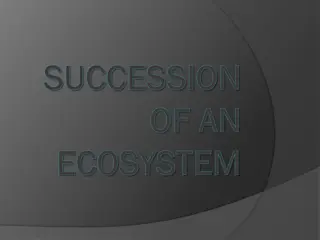Social Responsibility and Guilt in "An Inspector Calls
The play "An Inspector Calls" by J.B. Priestley revolves around the Birling family and Gerald celebrating the engagement of Sheila and Gerald. As the Inspector arrives and starts making inquiries about the suicide of Eva Smith, dark secrets begin to unravel. Each family member is implicated in the t
2 views • 8 slides
The Book of Revelation: Study on Chapter 16 - Bowls of God's Wrath
Chapter 16 of the Book of Revelation describes the pouring out of the seven bowls of God's wrath, signaling the completion of His judgment. These bowls bring plagues like sores, darkness, hail, and more upon the earth and its inhabitants. The commission to pour out these judgments represents the cli
0 views • 26 slides
Theater Conventions and Characterization in Drama
Theater conventions such as prologues, epilogues, dialogues, monologues, and dramatic structure like exposition, rising action, climax, falling action, and resolution are explored in drama. Additionally, the importance of character creation through techniques like backstories, flashbacks, and flashf
1 views • 4 slides
Plot Structure in Storytelling
Delve into the essential components of a plot - from the exposition introducing characters and setting, to the rising action building tension towards the climax, and the resolution in the falling action. Explore these elements through the journey of Tsotsi and his gang as they navigate through confl
1 views • 13 slides
Samuel Beckett's Waiting for Godot: A Modernist Masterpiece
Samuel Beckett, a prominent modernist writer, crafted the groundbreaking play "Waiting for Godot" as a tragicomedy in a theater of the absurd. Set in a vague time and place, the play reflects the post-World War II disillusionment and existential themes. Beckett's experimental approach challenges tra
2 views • 16 slides
Ecosystems and Disease Ecology
Explore the diverse types of ecosystems, including autochthonous, anthropurgic, and synanthropic ecosystems, and their impact on disease ecology. Learn about biotopes, biocenosis, ecological mosaics, and ecological interfaces, and discover how infectious diseases can be transmitted across these inte
0 views • 10 slides
Structure of Plays in Theatre Arts
Playwrights express ideas and convey messages through the structure of their plays. Analyzing a play's parts, arrangement, and meaning helps audiences grasp the central themes and messages. Key elements like the opening situation, initial incident, rising and falling action, climax, denouement, conf
0 views • 13 slides
The Friday Everything Changed - A Story of Equal Rights and Courage
In a rural North American one-room schoolhouse post-World War II, the story unfolds as Alma Nile questions why girls can't carry the water bucket, sparking a conflict between genders and the pursuit of equal rights. Miss Ralston, the protagonist, challenges tradition by standing up for the girls, le
0 views • 14 slides
Analysis of Conflict in "The Lady or the Tiger" by Frank R. Stockton
In "The Lady or the Tiger" by Frank R. Stockton, internal conflicts arise as the princess struggles with jealousy and decision-making, while external conflicts unfold between characters and outside forces like fate, society, and nature. Complications add layers of difficulty to the plot, leading to
1 views • 12 slides
Ecological Succession and Its Impacts
Ecological succession is the orderly process of change in an ecosystem, where one community replaces another until a stable climax is reached. This progression affects populations and species diversity. The process involves primary and secondary succession, with events like tornadoes, hurricanes, an
0 views • 23 slides
Analysis of Saki's "The Open Window
Saki's "The Open Window" is a cleverly crafted short story revolving around a practical joke played by a young woman, Vera, on an unsuspecting visitor. The plot unfolds through the exposition, complications, climax, resolution, and conclusion stages, highlighting Vera's storytelling skills and the t
0 views • 8 slides
Plot Diagrams: Elements and Structure
A plot diagram is a framework that outlines the sequence of events in a story. It consists of key elements like exposition, inciting incident, rising action, climax, falling action, and resolution. Each element plays a crucial role in developing the plot and engaging the reader throughout the narrat
0 views • 10 slides
Unveiling the Complexity of Lennie in "Of Mice and Men
Delve into the intriguing character of Lennie in "Of Mice and Men" by exploring his characterization, pivotal events involving him, thematic significance, and the overall structural approach in crafting an analytical essay. Uncover how Steinbeck uses Lennie to convey themes of friendship and the pur
0 views • 17 slides
The Lady or the Tiger: Analysis and Symbolism
Introduction of characters and plot elements in "The Lady or the Tiger" by Frank Stockton, along with an exploration of symbolism and themes related to choice, love, jealousy, and justice. The story revolves around a princess who must decide the fate of her lover, leading to a dramatic climax that l
0 views • 16 slides
Narrative Stories and Plot Structure
A narrative text is a story composed of various elements such as characters, setting, conflict, events, climax, and resolution. The structure of a narrative story can be dissected into parts like beginning, middle, and end, each serving a specific purpose in storytelling. By plotting the story on a
0 views • 13 slides
Literary Devices and Techniques in Storytelling
Delve into the world of storytelling with an examination of key literary devices and techniques such as plot, exposition, rising action, climax, falling action, and denouement. Understand the significance of similes, metaphors, personification, and other tools that bring narratives to life.
0 views • 82 slides
The Great Gatsby Chapter 7 and 8 Overview
In Chapter 7 of "The Great Gatsby," tensions rise as Gatsby, Tom, and Daisy confront each other, leading to a tragic climax in the romance between Gatsby and Daisy. Chapter 8 continues the unfolding drama with Nick advising Gatsby to leave Long Island and the consequences of Myrtle's death. The stor
1 views • 11 slides
Analysis of Edgar Allan Poe's "The Black Cat
The story "The Black Cat" by Edgar Allan Poe delves into the descent of a man into madness, fueled by alcoholism and violence towards animals and his wife. The narrative explores internal conflicts of addiction and external conflicts with animals, leading to a tragic climax where the narrator ends u
0 views • 18 slides
Analysis of Poetic Techniques in "Mrs. Midas" Verses for Mood Creation
Late September in "Mrs. Midas", the use of poetic techniques such as personification, contrast in consonant sounds, and building tension through language effectively conveys the relaxed atmosphere changing to chaos. The language choice in building up to the climax adds to the absurdity and horror of
1 views • 9 slides
Journey Through "The Odyssey": Themes, Author, and Literary Analysis
Explore the epic journey of Odysseus in "The Odyssey," delving into themes of pride, love, courage, and more. Uncover the background of the author, Homer, and the ancient Greek world. Identify key literary vocabulary and skills essential for the study of literature. Discover how the text is organize
0 views • 22 slides
The Elements of Short Stories
Exploring the key components of short stories, this guide covers plot structure, setting, conflict, and more. Learn how elements like introduction, climax, and resolution shape narrative arcs and engage readers.
0 views • 22 slides
Wonder Novel Review and Analysis
A comprehensive review and character analysis of the novel "Wonder" by R.J. Palacio. Explore the central themes of kindness, inner strength, and overcoming adversity through the protagonist, Auggie, who faces challenges due to a facial deformity. Witness the climax where Auggie stands up against bul
0 views • 4 slides
Plot Structure and Conflict in Storytelling
Plot structure is a key element in storytelling that outlines the sequence of events in a narrative. It consists of the exposition, rising action, climax, falling action, and resolution. Additionally, conflicts drive the plot by creating tension and obstacles for the characters to overcome, such as
0 views • 13 slides
Shakespeare's Endings: A Study of Conclusions in His Works
Explore the fascinating endings of Shakespeare's plays, from tragic deaths to joyful unions. Delve into the textual construction of these endings and the aftermath when the curtains close. Discover how different genres influence the climax and resolution of Shakespeare's masterpieces.
0 views • 25 slides
Indiana's Final Dilemma: An Epic Adventure Story
Set in a perilous jungle temple, Indiana faces the ultimate challenge as he confronts mysterious creatures and overcomes treacherous obstacles to claim a powerful artifact. With rich descriptions and engaging narrative techniques, the story culminates in a thrilling climax that will keep readers on
0 views • 6 slides
Analysis of "And of Clay Are We Created" Literary Terms
In the analysis of "And of Clay Are We Created," the plot unfolds with events such as a volcano eruption in South America, a little girl trapped in the rubble, and the challenges faced in rescuing her. The story progresses through exposition, conflict, rising action, and climax, highlighting the the
0 views • 22 slides
Analysis of 'Giraffes Can't Dance' Story Elements
In "Giraffes Can’t Dance" story by Giles Andreae, the main character Gerald faces external and internal conflicts when other animals mock his dancing. The inciting force is the annual Jungle Dance, leading to the climax where Gerald learns to dance to his own tune with help from a cricket. This he
0 views • 18 slides
Creating a Beowulf-Inspired Superhero for Marvel Comics
Hired by Marvel Comics, you are tasked with developing a new superhero embodying the qualities of Beowulf. This project involves designing a brave, kind, protective, and honest character with superhuman abilities and a flaw, set in an Anglo-Saxon inspired society that values bravery, honesty, and co
0 views • 12 slides
Analysis of "Before Breakfast" by Eugene O'Neill
In Eugene O'Neill's play "Before Breakfast," the focus is on Mrs. Rowland, while her husband Alfred remains offstage. The plot revolves around the powerful conflict and emotions faced by Mrs. Rowland, leading to a tragic and dramatic portrayal of a "tragedy" on stage. Through Mrs. Rowland's distorte
0 views • 4 slides
Insights on the Preaching of the Gospel and Final Crisis Preparation
The forthcoming climax of history involves the global preaching of the Gospel after the outpouring of the Holy Spirit, signifying the latter rain. Those faithful to God, obeying His commandments and sealed with His mark, will be ready for the final crisis. Understanding the significance of God's sea
0 views • 12 slides
Stylistic Devices: Metaphor, Metonymy, Repetition, and More
Delve into the theory of stylistic devices proposed by V.V. Gurevich, covering figures of speech, structural devices, and phonetic expressive means. Discover examples of metaphors, metonymy, repetition techniques like anaphora and climax, along with their impact on language usage and expression.
0 views • 22 slides
Analyzing "Sniper" by Liam O'Flaherty: Plot Elements, Characterization, Setting, and Theme
Exploring the plot diagram of "Sniper" by Liam O'Flaherty, this analysis delves into the exposition, inciting incident, rising action, climax, falling action, resolution, and dènouement of the story. It discusses the development of characterization, vivid description of the setting, the importance
0 views • 12 slides
The Transformation of Will Arblaster: A Western Tale
Will Arblaster, a young gentleman seeking adventure and money, evolves throughout the story as his Id clashes with his Superego. From initial conflict to climax and falling action, Will grapples with his choices and their impact on others. Ultimately, he undergoes a significant change, mediating bet
0 views • 9 slides
Historical Fiction Writing Techniques
Delve into the art of historical fiction writing through thematic exploration, character development, and crafting compelling narratives set in specific historical periods. Enhance your skills in characterisation, setting, atmosphere, turning points, and climax by engaging in creative tasks such as
0 views • 28 slides
Plant Community Succession and Ecological Transitions
Explore the dynamic process of plant community succession, from pioneer stages to climax communities, and the intricate patterns of transitions in ecological systems. Discover the variability and stability of different states within ecosystems, highlighting the complexities of natural ecological dyn
0 views • 14 slides
Messianic Interpretations in the Old Testament
The discussion revolves around the rejection of defining the Old Testament as solely messianic and how the early Church ascribed such texts to Jesus based on their conviction rather than explicit Old Testament support. The evolving evangelical perspective towards the Hebrew Bible's messianic nature
0 views • 34 slides
Unraveling the Final Chapter of The Odyssey: A Tale of Reveal and Retribution
As we approach the climax of The Odyssey, the anticipation mounts as Odysseus' true identity nears revelation. Predictions swirl around the reactions of characters like Eurycleia and the adherence to the ancient Greek tradition of guest-friendship. Episode 12's title, "A Grim Harvest," sets a forebo
0 views • 11 slides
Literary Terms Explained: From Alliteration to Conflict
Explore essential literary terms such as alliteration, allusion, analogy, antagonist, assonance, character, characterization, climax, and conflict. Learn about these terms and their examples to enhance your understanding of literature.
0 views • 40 slides
Updates and Plans for the Climate Change Initiative (CCI)
The update covers key topics discussed, such as consistency analysis, COP-21 summary, open issues, and future plans of CCI teams. Attendance from represented teams, special issue publications, and discussions on Sentinel data access were highlighted. Additionally, there were mentions of upcoming dev
0 views • 14 slides
Ecosystem Succession
Ecosystem succession involves the changing of species composition over time, with two main types - primary and secondary succession. Primary succession starts from barren landscapes, while secondary succession occurs on existing soil. The process goes through stages known as seral stages, leading to
0 views • 12 slides
